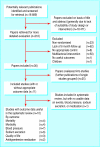Systematic review of long term effects of advice to reduce dietary salt in adults
- PMID: 12242173
- PMCID: PMC126303
- DOI: 10.1136/bmj.325.7365.628
Systematic review of long term effects of advice to reduce dietary salt in adults
Abstract
Objective: To assess the long term effects of advice to restrict dietary sodium in adults with and without hypertension.
Design: Systematic review and meta-analysis of randomised controlled trials.
Data sources: Cochrane library, Medline, Embase, and bibliographies.
Study selection: Unconfounded randomised trials that aimed to reduce sodium intake in healthy adults over at least 6 months. Inclusion decisions, validity and data extraction were duplicated. Random effects meta-analysis, subgrouping, sensitivity analysis, and meta-regression were performed.
Outcomes: Mortality, cardiovascular events, blood pressure, urinary sodium excretion, quality of life, and use of antihypertensive drugs.
Results: Three trials in normotensive people (n=2326), five trials in those with untreated hypertension (n=387), and three trials in people being treated for hypertension (n=801) were included, with follow up from six months to seven years. The large high quality (and therefore most informative) studies used intensive behavioural interventions. Deaths and cardiovascular events were inconsistently defined and reported. There were 17 deaths, equally distributed between intervention and control groups. Systolic and diastolic blood pressures were reduced (systolic by 1.1 mm Hg, 95% confidence interval 1.8 to 0.4 mm Hg; diastolic by 0.6 mm Hg, 1.5 to -0.3 mm Hg) at 13 to 60 months, as was urinary 24 hour sodium excretion (by 35.5 mmol/24 hours, 47.2 to 23.9). Degree of reduction in sodium intake and change in blood pressure were not related.
Conclusions: Intensive interventions, unsuited to primary care or population prevention programmes, provide only small reductions in blood pressure and sodium excretion, and effects on deaths and cardiovascular events are unclear. Advice to reduce sodium intake may help people on antihypertensive drugs to stop their medication while maintaining good blood pressure control.
Figures



Comment in
-
Long term effects of advice to reduce dietary salt. Front cover was highly misleading.BMJ. 2003 Jan 25;326(7382):222; author reply 222. doi: 10.1136/bmj.326.7382.222/a. BMJ. 2003. PMID: 12543848 Free PMC article. No abstract available.
-
Long term effects of advice to reduce dietary salt. Critical faculties should always be exercised.BMJ. 2003 Jan 25;326(7382):222; author reply 222. BMJ. 2003. PMID: 12549443 No abstract available.
-
Long term effects of advice to reduce dietary salt. Salt needs to be reduced in manufacturing and processing food.BMJ. 2003 Jan 25;326(7382):222; author reply 222. BMJ. 2003. PMID: 12549444 No abstract available.
References
-
- Midgley JP, Matthew AG, Greenwood CM, Logan AG. Effect of reduced dietary sodium on blood pressure: a meta-analysis of randomized controlled trials. JAMA. 1996;275:1590–1597. - PubMed
-
- Cutler JA, Follmann D, Allender PS. Randomized trials of sodium reduction: an overview. Am J Clin Nutr. 1997;65(suppl 2):643–51S. - PubMed
-
- Graudal NA, Galloe AM, Garred P. Effects of sodium restriction on blood pressure, renin, aldosterone, catecholamines, cholesterols, and triglyceride: a meta-analysis. JAMA. 1998;279:1383–1391. - PubMed
-
- Alam S, Johnson AG. A meta-analysis of randomised controlled trials (RCT) among healthy normotensive and essential hypertensive elderly patients to determine the effect of high salt (NaCl) diet on blood pressure. J Hum Hypertens. 1999;13:367–374. - PubMed
Publication types
MeSH terms
Substances
LinkOut - more resources
Full Text Sources
Medical
